

Samuelson: Economy Doesn't Go Bust Often Enough - Newsweek.com. Op-Ed Columnist - Superbroke, Superfrugal, Superpower? 20th-century America: Then and now. An Interesting “Collapse” Hypothetical. Dr.
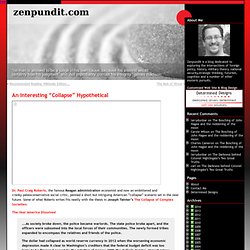
Mindy S. Lubber: Lessons from the Edge. Jared Diamond is the prophet of sinking societies.
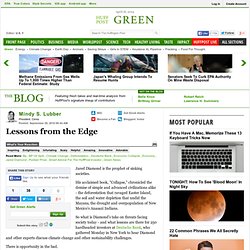
His acclaimed book, "Collapse," chronicled the demise of simple and advanced civilizations alike - the deforestation that ravaged Easter Island, the soil and water depletion that undid the Mayans, the drought and overpopulation of New Mexico's Anasazi Indians. So what is Diamond's take on threats facing society today - and what lessons are there for 250 hardheaded investors at Deutsche Bank, who gathered Monday in New York to hear Diamond and other experts discuss climate change and other sustainability challenges.
There is opportunity in the bad. The Pulitzer Prize-winning author rattled off a dozen dire challenges facing humanity - including climate change, soil depletion, water constraints, threatened fisheries and low-cost energy. Each of these threats, he said, could single-handedly trigger the dreaded "C" word - collapse. And he was quick to remind the investors that these threats are absolutely relevant to their jobs. A parable about how one nation came to financial ruin. - By Charles Munger. In the early 1700s, Europeans discovered in the Pacific Ocean a large, unpopulated island with a temperate climate, rich in all nature's bounty except coal, oil, and natural gas.
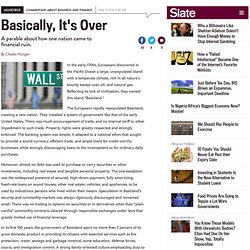
Reflecting its lack of civilization, they named this island "Basicland. " The Europeans rapidly repopulated Basicland, creating a new nation. They installed a system of government like that of the early United States. There was much encouragement of trade, and no internal tariff or other impediment to such trade. Property rights were greatly respected and strongly enforced. Moreover, almost no debt was used to purchase or carry securities or other investments, including real estate and tangible personal property.
A Plague Upon The World: The USA is a “Failed State” Interview with Dr.
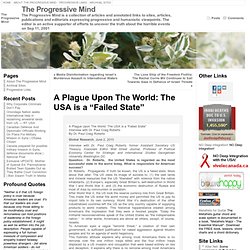
Paul Craig Roberts, former Assistant Secretary US Treasury, Associate Editor Wall Street Journal, Professor of Political Economy Center for Strategic and International Studies Georgetown University Washington DC. Question: Dr. Roberts, the United States is regarded as the most successful state in the world today. What is responsible for American success? Dr. After World War II, the US took the reserve currency role from Great Britain. To American eyes a vague “terrorist threat,” a creation of their own government, is sufficient justification for naked aggression against Muslim peoples and for an agenda of world hegemony. This hubristic attitude explains why among most Americans there is no remorse over the one million Iraqis killed and the four million Iraqis displaced by a US invasion and occupation that were based entirely on lies and deception.
Question: You said that the US was a failed state. America's Road To Perdition. There's a sad story making the rounds which should be Front Page News in this great land of ours, but it has received scant attention.
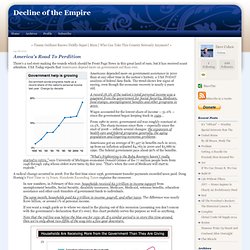
USA Today reports that Americans depend more on government aid than ever. Americans depended more on government assistance in 2010 than at any other time in the nation's history, a USA TODAY analysis of federal data finds. The trend shows few signs of easing, even though the economic recovery is nearly 2 years old.A record 18.3% of the nation's total personal income was a payment from the government for Social Security, Medicare, food stamps, unemployment benefits and other programs in 2010.Wages accounted for the lowest share of income — 51.0% — since the government began keeping track in 1929...From 1980 to 2000, government aid was roughly constant at 12.5%. A radical change occurred in 2008. The Breakdown Of Economic Expansion In The 21st Century. Although the International Monetary Fund (IMF) assures us that global economic growth is proceeding apace, there are good reasons to believe that GDP numbers recording that growth exaggerate the economic expansion underway.
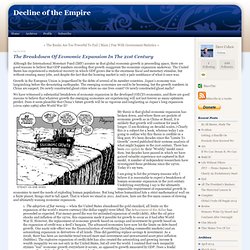
The United States has experienced a statistical recovery in which GDP grows due to the enormous fiscal and monetary stimulus, but without creating many jobs, and despite the fact that the housing market is only a pale semblance of what it once was. Growth in the European Union is jeopardized by the debts of several of its member countries. Japan's economy was languishing before the devastating earthquake. The emerging economies are said to be booming, but the growth numbers in China are suspect. Do newly constructed ghost cities where no one lives count? My thesis is that global economic expansion has broken down, and where there are pockets of economic growth as in China or Brazil, it is unlikely that growth will continue for much longer.
Updated assessment of the ‘hacking the state’ strategy. “In my original idea, hacking the state was quite simply about motivating people to acquire the necessary knowledge of the ways – both open and covert – the state is functioning and apply this knowledge to make, or even force, the state to work for the benefit of the people and not for its own institutional sake.
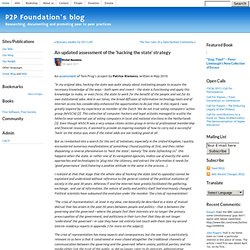
And in our times, the broad diffusion of information technology tools and of Internet access has considerably enhanced the opportunities to do just that. In this regard, I was greatly inspired by my experience as member of the Dutch ‘We do not trust voting computers’ action group (WVSCN) [2]. Why America Is Not a New Rome. Short thoughts, mostly about the decline of America. 1.
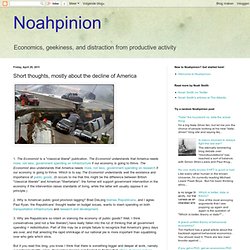
The Economist is a "classical liberal" publication. The Economist understands that America needs more, not less, government spending on infrastructure if our economy is going to thrive. Grand Strategy: The View from Oregon. Sobering opening for Aspen Ideas Festival.